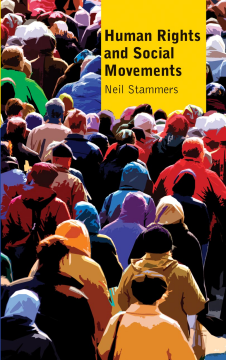
Additional Information
Book Details
Abstract
This book champions social movements as one of the most influential agents that shape our conceptions of human rights.
It argues that human rights cannot be understood outside of the context of social movement struggles. It explains how much of the literature on human rights has systematically obscured this link, consequently distorting our understandings of human rights.
Neil Stammers shows how human rights can be understood. He suggests that what he calls the 'paradox of institutionalisation' can only be addressed through a recognition of the importance of human rights arising out of grassroots activism, and through processes of institutional democratisation.
'A lively, provocative and insightful discussion of human rights and social movements that goes to the heart of what human rights are, what they are not, and what we might aspire for them to be'
Professor Richard A. Wilson, Director, Human Rights Institute, University of Connecticut
'Explores the difficult relationship between human rights and social movement activist practices.'
Upendra Baxi, Emeritus Professor of Law, University of Warwick.
Table of Contents
| Section Title | Page | Action | Price |
|---|---|---|---|
| Cover | Cover | ||
| Contents | v | ||
| List of Figures | vii | ||
| Acknowledgements | viii | ||
| List of Acronyms and Abbreviations | x | ||
| Introduction | 1 | ||
| 1. Getting Beyond the Hall of Mirrors | 8 | ||
| The Hall of Mirrors | 9 | ||
| Rediscovering Creative Movement Praxis | 24 | ||
| 2. The 'Sociality' of Natural Rights | 40 | ||
| Natural Rights in the Hall of Mirrors | 41 | ||
| Social Movement Praxis in the Seventeenthand Eighteenth Centuries | 48 | ||
| 3. The Lost Nineteenth Century | 70 | ||
| Understanding and Explaining Absence | 72 | ||
| The Rise of Workers’ and Socialist Movements | 76 | ||
| At the Heart of the Nineteenth Century: Struggles for Self-Determination | 88 | ||
| 4. The Paradox of Institutionalisation | 102 | ||
| Institutions and Institutionalisation | 103 | ||
| The Institutionalisation of Particularity | 110 | ||
| The Institutionalisation of Universality | 116 | ||
| The Paradox and Human Rights Activism | 124 | ||
| 5. New Movements? Old Wrongs? | 131 | ||
| Conceptualising ‘New Social Movements’ | 132 | ||
| Re-opening the Analysis and Critique of Power | 139 | ||
| Five Sites of Power and ‘Old Wrongs’ | 148 | ||
| ‘Ageing’ and Resurgence | 152 | ||
| 6. Expressive and Instrumental Dimensions of Movement Activism | 160 | ||
| Locating the Expressive Dimension | 161 | ||
| From ‘Interests’ to ‘Identities’ | 169 | ||
| From Identity to Recognition | 179 | ||
| The Expressive/Instrumental Dynamic | 185 | ||
| 7. Analyses of Globalisations and Human Rights | 190 | ||
| On Globalisation | 191 | ||
| Human Rights as Globalisation | 193 | ||
| The Rise of a ‘Movement of Movements’? | 206 | ||
| 8. Renewing the Challenge to Power | 214 | ||
| The Contemporary Crises of Human Rights | 216 | ||
| Re-orienting Creative Human Rights Praxis | 228 | ||
| Human Rights and Institutional Democratisation | 240 | ||
| Notes | 250 | ||
| Bibliography | 256 | ||
| Index | 276 |
